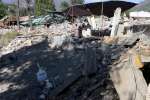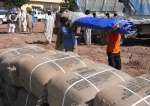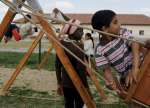FRAME Toolkit: Framework for Assessing, Monitoring and Evaluating the environment in refugee-related operations
Environment, 28 August 2009
As part of an ongoing effort to provide UNHCR managers and field staff, as well as key operational partners, with appropriate tools that will enable them to look into the issues of environmental assessment, monitoring and evaluation, UNHCR, together with a range of organisations and specialist individuals, has prepared this collection of tools and guidance under a project knows as FRAME – Framework for Assessing, Monitoring and Evaluating the Environment in Refugee-related Operations.
- FRAME Toolkit: Module I – Introduction
- FRAME Toolkit: Module II – Environmental Assessment
- FRAME Toolkit: Module III – Rapid Environmental Assessment
- FRAME Toolkit: Module IV – Community Environmental Action Planning
- FRAME Toolkit: Module V – Environmental Indicator Framework
- FRAME Toolkit: Module VII – Evaluation










































